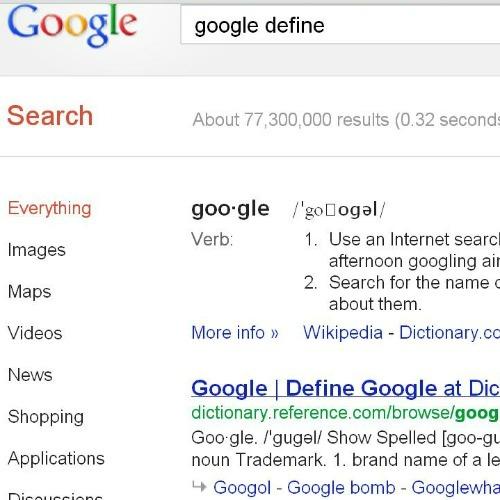BOB GARFIELD: There’s a man in Arizona who really loves the word “Google.” Last month he filed a legal challenge to Google’s trademark, arguing that its ubiquity had turned “Google” into a verb. The same man had earlier lost a case, when he was sued by Google for infringing on its trademark on some 750 websites, such as Googlegaycruises.com. Jessica Litman, a professor at the University of Michigan, says Google may retain its trademark for now but genericide may still be in its future. After all, many familiar products were once brand names.
JESSICA LITMAN: Teflon, escalator, cellophane. Shredded wheat was once a trademark. It’s not necessarily a tragedy. Lots of companies have continued to earn a great deal of money, despite losing their trademark.
BOB GARFIELD: This issue seems to be the ultimate good news/bad news joke. The good news is congratulations, Google. You are synonymous with “Internet search.” This gives you a huge competitive advantage. And the bad news, is:
JESSICA LITMAN: If consumers think that all Internet search engines are Googles and googling is what you do when you use Bing or Yahoo Search or some other search, then that word ceases to have trademark significance and becomes the generic word for an Internet search engine.
BOB GARFIELD: When a brand’s name does become genericized or when it’s verging on that, brands tend to do something which seems so awkward. They start calling themselves “Coke brand” or “brand Coke” and other language that nobody uses in the actual - galaxy. There was one case with Johnson & Johnson and Band-Aids. They took the slogan, “I’m stuck on Band-Aid” and changed it [LAUGHS] to “I’m stuck on Band-Aid brand.”
[BAND-AID COMMERCIAL CLIP]:
CHILD SINGING: I am stuck on Band-Aid brand 'cause Band-Aid’s stuck on me.
WOMAN: Moms trust Band-Aid brand to heal the hurt better than store brands.
CHILD LAUGHING/CHILDREN SINGING: I am stuck on Band-Aid brand 'cause Band-Aid’s stuck on me.
[END CLIP]
JESSICA LITMAN: One of the most persuasive pieces of evidence that a mark has either become generic or is in danger is when you hear people talking about Royal brand Jello, Curad brand Band-Aids, Puff’s brand Kleenex. Then you know that at least that consumer understands the brand name as a generic term for the whole product category.
JESSICA LITMAN: The policy of underlying genericide is really consumer protective. If they understand a word is a brand name, then letting someone else use it will confuse them. If, on the other hand, they understand it as the name for the kind of product, then if we don’t let competitors use that word, they won’t be able to communicate to consumers that they’re a different brand of that product.
BOB GARFIELD: Back in the day, I used to get a lot of letters as a reporter, let’s say, from the Xerox Corporation, that said, “We detected that you use “xerox” lowercase to talk about photocopying. Let us remind you that Xerox is the trademark property,” blah-b-blah-blah-blah-blah, don’t do this anymore or we will send people out and kill you.” I don’t remember the details, but it was sharply worded. I haven’t gotten one of those in decades.
JESSICA LITMAN: Well, it’s not illegal for you to use “xerox” to mean photocopying or “realtor” to mean real estate agent. None of that is actionable. Companies send those letters to frighten people. But as the Internet enabled people to publicize their overstepping cease and desist letters, companies discovered they got some bad press from sending them out too promiscuously, and I think they’ve cut back.
BOB GARFIELD: Our producer Chris Neary [LAUGHS] likes the idea that brands can become like rock stars; they become so big and famous as to ultimately destroy themselves. One of them is Aspirin. It used to be owned lock, stock and barrel by the Bayer Company, and then they blew it.
JESSICA LITMAN: Aspirin was interested in selling Aspirin tablets to anyone who wanted to buy them and resell them to the consumer. So they licensed their product to pharmacies, to other drug manufacturers and all of them put “Aspirin” on the bottles but they also put their own names on the bottles. And consumers, quite understandably, came to the conclusion that aspirin was a product, and Bayer was just one of many manufacturers.
BOB GARFIELD: So it’s possible that someday the Microsoft Corporation will say, “Do your googling on Bing.”
JESSICA LITMAN: Sure, it is.
BOB GARFIELD: I don’t know if I want to live in that world. It just –
JESSICA LITMAN: [LAUGHING]
BOB GARFIELD: Jessica, thank you so much.
JESSICA LITMAN: Sure thing.
BOB GARFIELD: Jessica Litman is a professor of law at the University of Michigan brand Law School in brand Ann Arbor, Michigan.
[MUSIC/UP AND UNDER]
BROOKE GLADSTONE: Coming up, two OTM producers go all Fanboy on their video gamemaker hero.
BOB GARFIELD: This is On the Media.
